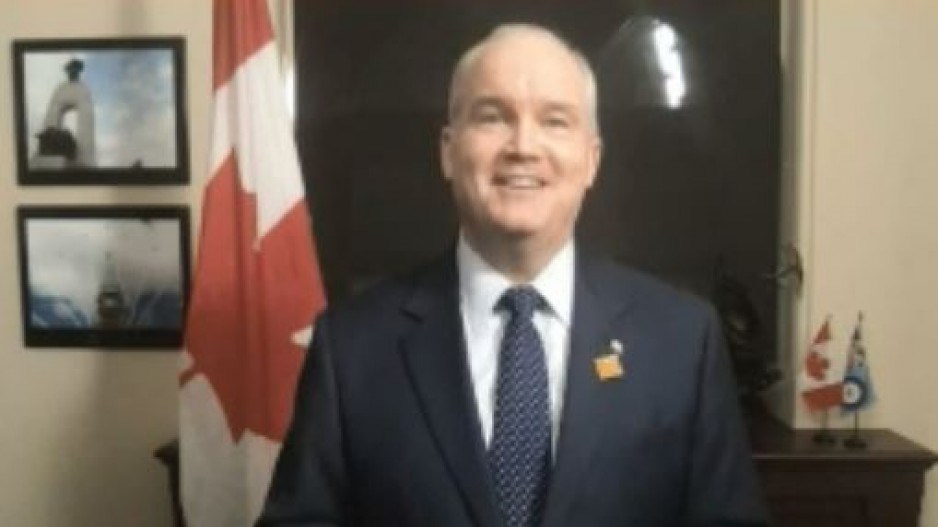Conservative Party Leader Erin O’Toole doesn’t believe Prime Minister Justin Trudeau will risk holding a summer election, especially given the fact Canada is so far behind other countries in obtaining COVID-19 vaccines.
Canada could still be dealing with pandemic related restrictions in June, the date that has been speculated could be when Trudeau calls for a snap election to be held.
But if Trudeau does call for a summer election, O'Toole said his party is ready to build on the blue wave that swept much of Western Canada in the 2019 election.
In the last election, the Liberals lost six seats in B.C., with the Conservatives picking up some of them. The Conservsatives won17 seats. The Liberals and NDP each won 11 seats.
O’Toole’s Conservatives are still five percentage points behind Trudeau’s Liberals in the polls, but that could change, depending how the Trudeau government manages the COVID-19 crisis and a vaccine rollout over the next few months.
In a virtual talk Thursday with the Greater Vancouver Board of Trade (GVBOT), O’Toole sketched out how a Conservative government would differ from a Liberal government, or from the previous Stephen Harper Conservative government, for that matter.
He talked about a new trade relationship with allied democratic countries, holding the line on taxes, tackling a ballooning federal deficit and debt, a “relentless” focus on jobs and a very different attitude towards China.
“Canada needs a serious government that is relentlessly focused on jobs and our economic recovery,” he said.
He said 40% of Canadian businesses fear they may face insolvency over the next year. He added two-thirds of Canadians work for a small or medium-sized business. Saving those businesses would be a priority of a Conservative government, O’Toole said.
Asked how he will appeal to Millennials, O’Toole said the Conservative caucus already has the highest number of Millennials of any caucus. Appealing to the more progressive inclinations of Millennials, he said he is pro-choice and pro-LGBT rights.
And though he said he likes the idea of a net zero target to deal with climate change, he said he is not a fan of the federal carbon tax and was fuzzy about how Conservative policies on climate change and energy would differ from the Trudeau government's.
While he said he is in favour of letting provinces decide their own climate change policies, he stopped short of saying he would scrap the federal carbon tax.
O’Toole said Canada is facing one of the worst crises in its history, as a result of the pandemic, and accused the Trudeau Liberal government of fumbling the ball.
“We have to plan for that economic recovery now,” he said. “We can’t wait until the pandemic is over. Sadly, Mr. Trudeau, whether it was on the border, rapid tests, vaccines, they’re always two or three steps behind, and I don’t think that’s leadership.”
Even before the pandemic, the Trudeau government had racked up $100 billion in debt, he said, and has since added another $400 billion in spending related to the pandemic.
“That’s a half a trillion in the last five years,” O'Toole said, adding those kinds of debt levels threaten things like old age security and health care spending, and should be of a concern to the Millennials who will be shouldering a lot of the debt burden.
He said debt and deficit reduction would be a priority for a Conservative government, but warned that it would be a decade-long exercise.
Asked how a Conservative government would balance debt reduction, holding the line on taxes and aiding businesses all at the same time, O’Toole said the way to do that is job creation and growing the economy.
“What we have to do is get to as much full employment, as we’re winding down assistance programs, as possible,” he said.
On trade, foreign relations and security, O’Toole, who was a captain in the Armed Forces and foreign affairs critic under Stephen Harper, said his approach to China would be an “eyes wide open relation.”
Canada and other western democratic countries “looked the other way” on China’s attitude towards human rights, the rule of law and trade, he said, in the hope that engagement would make China more open and less repressive.
“In the last few years in particular, we’ve seen the reverse,” O’Toole said, pointing to Hong Kong, which he described as “now a police state.”
“They do not adhere to rules based international trade order, and there’s a genocide happening with respect to the Uyghur minority population. That should trouble Canadians. We are free traders, but our values are not for sale.”
He suggested Magnitsky sanctions should be imposed against key Chinese government officials for China’s holding of two Canadians as “diplomatic hostages” in retaliation for Canada’s detaining Meng Wanzhou for extradition to the U.S.
He suggested Canada should more to its traditional allies in terms of trade relations. He has promoted the idea of a new trade and security alliance with the UK, Australia and New Zealand – the so-called CANZUK agreement proposal – that would see tariff-free trade between the former commonwealth countries, and greater freedom of work, movement and study.




